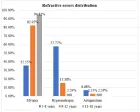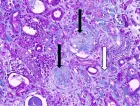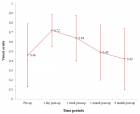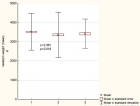Abstract
Research Article
The effect of frequency of sexual intercourse on coronary artery disease
Mehdi Karasu*, Özkan Karaca, Mehmet Ali Kobat, Tarık Kıvrak and Mehmet İkbal İpek
Published: 07 June, 2022 | Volume 6 - Issue 1 | Pages: 001-004
Background: Doubts about the safety of sexual activity are common among cardiac patients and physicians alike, and are often neglected during routine checkups or on discharge from the hospital following a cardiac event or invasive procedure. Although it varies from society to society, it is considered taboo by most patients, so it is reluctant to ask the doctor about sexual activity. Doctors, on the other hand, remain silent due to the lack of clear information about the effect of sexual activity on coronary artery diseases or the presence of doubts. It is ultimately set aside by professionals and their patients. The patient does not ask and the doctor does not answer. This study, it was aimed to investigate the effect of the frequency of sexual intercourse on coronary artery disease.
Methods: After applying the exclusion criteria, the remaining 180 patients were included in the study. A self-administered survey was applied to the patients before coronary angiography and patients were assessed according to the presence of additional diseases, their demographic characteristics, and the frequency of sexual intercourse. Two experienced physicians evaluated the angiographic results. Firstly Patients were grouped as 90 patients with normal coronary anatomy and 90 patients with coronary artery disease. After this, Coronary artery disease severity was evaluated according to syntax score.
Results: The mean age of the patients was 58 ± 12.5 years. The distribution of age is not reasonable. According to gender, the female/male ratio the proportion of men was higher in patients with coronary artery disease. İncidence of normal coronary anatomy increased as the frequency of sexual intercourse increased. P - value was 0.037 and the result was statistically significant. The frequency of sexual intercourse was found to be 4.2/per month. The relationship between the Syntax score and frequency of sexual intercourse was not statistically significant
(p > 0.05).
Conclusion: As a result of the study, it was seen that patients with more frequent sexual intercourse had more normal coronary artery anatomy, and those with coronary artery disease had single coronary artery disease than multiple vascular disorders. it was concluded that the incidence of coronary artery disease and coronary artery disease severity decreased as the frequency of sexual intercourse increased. Sexual intercourse might be a preventive factor in the development of coronary artery disease.
Read Full Article HTML DOI: 10.29328/journal.avm.1001015 Cite this Article Read Full Article PDF
Keywords:
Coronary artery disease; Sexual intercourse
References
- World Health Organization. Making a difference. Geneva.
- Ross R. Atherosclerosis--an inflammatory disease. N Engl J Med. 1999 Jan 14;340(2):115-26. doi: 10.1056/NEJM199901143400207. PMID: 9887164.
- Imprialos KP, Stavropoulos K, Doumas M, Tziomalos K, Karagiannis A, Athyros VG. Sexual Dysfunction, Cardiovascular Risk and Effects of Pharmacotherapy. Curr Vasc Pharmacol. 2018 Jan 26;16(2):130-142. doi: 10.2174/1570161115666170609101502. PMID: 28595561.
- Montorsi F, Briganti A, Salonia A, Rigatti P, Margonato A, Macchi A, Galli S, Ravagnani PM, Montorsi P. Erectile dysfunction prevalence, time of onset and association with risk factors in 300 consecutive patients with acute chest pain and angiographically documented coronary artery disease. Eur Urol. 2003 Sep;44(3):360-4; discussion 364-5. doi: 10.1016/s0302-2838(03)00305-1. PMID: 12932937.
- Dostálová G, Hlubocká Z, Bayerová K, Bělohlávek J, Linhart A, Karetová D. Erectile Dysfunction in Young Myocardial Infarction Survivors: Evaluation, Follow Up. Am J Mens Health. 2017 Nov;11(6):1739-1744. doi: 10.1177/1557988317714359. Epub 2017 Jul 11. PMID: 28697641; PMCID: PMC5675271.
- Sangiorgi G, Pizzuto A, Diehm N, Greco F, Fusco F, Chiricolo G, Vismara A, Altieri VM, Cereda A, Bongo S. Endovascular therapy for erectile dysfunction: current knowledge and future perspectives. Minerva Cardiol Angiol. 2021 Oct;69(5):579-595. doi: 10.23736/S2724-5683.20.05136-1. Epub 2020 Jun 2. PMID: 32492987.
- Salehian R, Khodaeifar F, Naserbakht M, Meybodi A. Attitudes and Performance of Cardiologists Toward Sexual Issues in Cardiovascular Patients. Sex Med. 2017 Mar;5(1):e44-e53. doi: 10.1016/j.esxm.2016.09.002. Epub 2016 Dec 14. PMID: 27988217; PMCID: PMC5302380.
- Zhu X, Bonet B, Gillenwater H, Knopp RH. Opposing effects of estrogen and progestins on LDL oxidation and vascular wall cytotoxicity: implications for atherogenesis. Proc Soc Exp Biol Med. 1999 Dec;222(3):214-21. doi: 10.1046/j.1525-1373.1999.d01-138.x. PMID: 10601880.
- Elsherbiny A, Tricomi M, Bhatt D, Dandapantula HK. State-of-the-Art: a Review of Cardiovascular Effects of Testosterone Replacement Therapy in Adult Males. Curr Cardiol Rep. 2017 Apr;19(4):35. doi: 10.1007/s11886-017-0838-x. PMID: 28361372.
- Ho CH, Wu CC, Chen KC, Jaw FS, Yu HJ, Liu SP. Erectile dysfunction, loss of libido and low sexual frequency increase the risk of cardiovascular disease in men with low testosterone. Aging Male. 2016 Jun;19(2):96-101. doi: 10.3109/13685538.2015.1129400. Epub 2016 Jan 11. PMID: 26755067.
- Kumar J, Bhatia T, Kapoor A, Ranjan P, Srivastava A, Sinha A, Kumar S, Garg N, Tewari S, Kapoor R, Goel PK. Erectile dysfunction precedes and is associated with severity of coronary artery disease among Asian Indians. J Sex Med. 2013 May;10(5):1372-9. doi: 10.1111/jsm.12041. Epub 2013 Jan 24. PMID: 23347017.
- Feldman DI, Cainzos-Achirica M, Billups KL, DeFilippis AP, Chitaley K, Greenland P, Stein JH, Budoff MJ, Dardari Z, Miner M, Blumenthal RS, Nasir K, Blaha MJ. Subclinical Vascular Disease and Subsequent Erectile Dysfunction: The Multiethnic Study of Atherosclerosis (MESA). Clin Cardiol. 2016 May;39(5):291-8. doi: 10.1002/clc.22530. Epub 2016 May 3. PMID: 27145089; PMCID: PMC4879072.
- Hodges LD, Kirby M, Solanki J, O'Donnell J, Brodie DA. The temporal relationship between erectile dysfunction and cardiovascular disease. Int J Clin Pract. 2007 Dec;61(12):2019-25. doi: 10.1111/j.1742-1241.2007.01629.x. PMID: 17997808.
Figures:
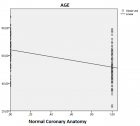
Figure 1
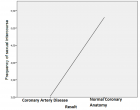
Figure 2
Similar Articles
-
The effect of frequency of sexual intercourse on coronary artery diseaseMehdi Karasu*,Özkan Karaca,Mehmet Ali Kobat,Tarık Kıvrak,Mehmet İkbal İpek. The effect of frequency of sexual intercourse on coronary artery disease. . 2022 doi: 10.29328/journal.avm.1001015; 6: 001-004
Recently Viewed
-
Transumbilical Single-incision Hiatal Hernia Repair and Nissen Fundoplication in situs Inversus Totalis: A Rare Case ReportQing Cao,Chen Kang,Kang Gu,Yin Peng,Yang Lv,Xu-Zhong Ding,Peng Li*. Transumbilical Single-incision Hiatal Hernia Repair and Nissen Fundoplication in situs Inversus Totalis: A Rare Case Report. Adv Treat ENT Disord. 2026: doi: 10.29328/journal.ated.1001017; 10: 001-003
-
Case Report of a Child with Beta Thalassemia Major in a Tribal Region of IndiaNeha Chauhan, Prakash Narayan, Mahesh Narayan, Manisha Shukla*. Case Report of a Child with Beta Thalassemia Major in a Tribal Region of India. J Child Adult Vaccines Immunol. 2023: doi: 10.29328/journal.jcavi.1001011; 7: 005-007
-
Hypercalcaemic Crisis Associated with Hyperthyroidism: A Rare and Challenging PresentationKarthik Baburaj*, Priya Thottiyil Nair, Abeed Hussain, Vimal MV. Hypercalcaemic Crisis Associated with Hyperthyroidism: A Rare and Challenging Presentation. Ann Clin Endocrinol Metabol. 2024: doi: 10.29328/journal.acem.1001029; 8: 001-003
-
Physical Performance in the Overweight/Obesity Children Evaluation and RehabilitationCristina Popescu, Mircea-Sebastian Șerbănescu, Gigi Calin*, Magdalena Rodica Trăistaru. Physical Performance in the Overweight/Obesity Children Evaluation and Rehabilitation. Ann Clin Endocrinol Metabol. 2024: doi: 10.29328/journal.acem.1001030; 8: 004-012
-
NAD⁺ Biology in Ageing and Chronic Disease: Mechanisms and Evidence across Skin, Fertility, Osteoarthritis, Hearing and Vision Loss, Gut Health, Cardiovascular–Hepatic Metabolism, Neurological Disorders, and MuscleRizwan Uppal,Umar Saeed*,Muhammad Rehan Uppal. NAD⁺ Biology in Ageing and Chronic Disease: Mechanisms and Evidence across Skin, Fertility, Osteoarthritis, Hearing and Vision Loss, Gut Health, Cardiovascular–Hepatic Metabolism, Neurological Disorders, and Muscle. Ann Clin Endocrinol Metabol. 2026: doi: 10.29328/journal.acem.1001032; 10: 001-009
Most Viewed
-
Impact of Latex Sensitization on Asthma and Rhinitis Progression: A Study at Abidjan-Cocody University Hospital - Côte d’Ivoire (Progression of Asthma and Rhinitis related to Latex Sensitization)Dasse Sery Romuald*, KL Siransy, N Koffi, RO Yeboah, EK Nguessan, HA Adou, VP Goran-Kouacou, AU Assi, JY Seri, S Moussa, D Oura, CL Memel, H Koya, E Atoukoula. Impact of Latex Sensitization on Asthma and Rhinitis Progression: A Study at Abidjan-Cocody University Hospital - Côte d’Ivoire (Progression of Asthma and Rhinitis related to Latex Sensitization). Arch Asthma Allergy Immunol. 2024 doi: 10.29328/journal.aaai.1001035; 8: 007-012
-
Causal Link between Human Blood Metabolites and Asthma: An Investigation Using Mendelian RandomizationYong-Qing Zhu, Xiao-Yan Meng, Jing-Hua Yang*. Causal Link between Human Blood Metabolites and Asthma: An Investigation Using Mendelian Randomization. Arch Asthma Allergy Immunol. 2023 doi: 10.29328/journal.aaai.1001032; 7: 012-022
-
An algorithm to safely manage oral food challenge in an office-based setting for children with multiple food allergiesNathalie Cottel,Aïcha Dieme,Véronique Orcel,Yannick Chantran,Mélisande Bourgoin-Heck,Jocelyne Just. An algorithm to safely manage oral food challenge in an office-based setting for children with multiple food allergies. Arch Asthma Allergy Immunol. 2021 doi: 10.29328/journal.aaai.1001027; 5: 030-037
-
Snow white: an allergic girl?Oreste Vittore Brenna*. Snow white: an allergic girl?. Arch Asthma Allergy Immunol. 2022 doi: 10.29328/journal.aaai.1001029; 6: 001-002
-
Cytokine intoxication as a model of cell apoptosis and predict of schizophrenia - like affective disordersElena Viktorovna Drozdova*. Cytokine intoxication as a model of cell apoptosis and predict of schizophrenia - like affective disorders. Arch Asthma Allergy Immunol. 2021 doi: 10.29328/journal.aaai.1001028; 5: 038-040

If you are already a member of our network and need to keep track of any developments regarding a question you have already submitted, click "take me to my Query."






